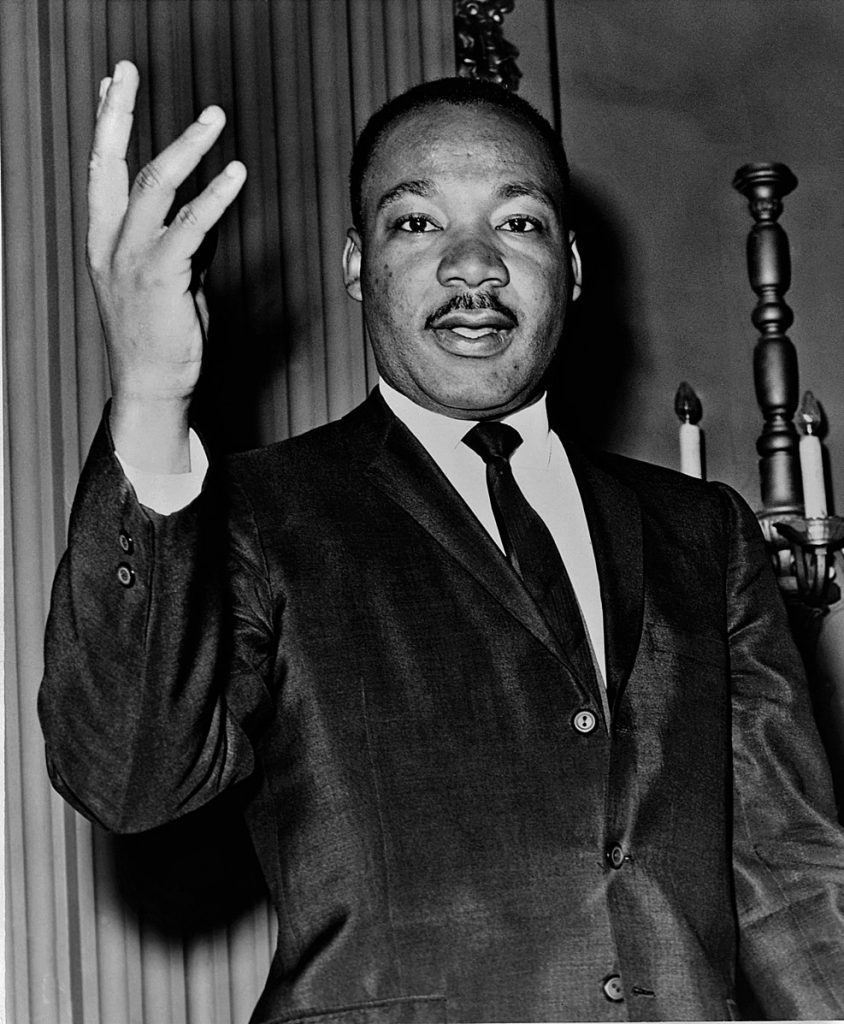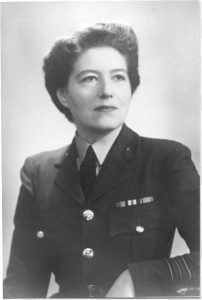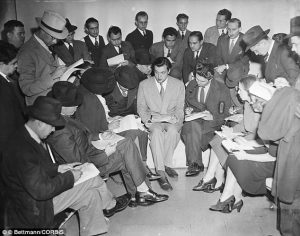When news broke that civil rights leader Martin Luther King Jr. had been killed on April 4, 1968 in Memphis, Tennessee, people couldn’t help but feel anger and outrage. King, who had started a revolution to end social injustice, had just been killed, and many people were left wondering if they would forever be stuck in a never-changing world.1

When black citizens in Washington D.C found out King had been killed, they wanted local stores to close out of respect for this civil rights leader. When stores did not close, this lack of respect sparked a dispute between citizens and the police. What started off as a peaceful mourning ended up a four-day violent riot where people were smashing windows, breaking into stores and hurting each other. Store owners wrote “Soul Brother” on their windows to let rioters know they were black-owned and also mourned King’s death. Because Dr. King didn’t believe violence was the answer, it’s ironic that rioters used violence to show their anger about his assassination.2
The rioters seemed ready for war and had no plans on stopping, which caused 13,600 troops, along with the National Guard, to try to end the riots. They gave the citizens a curfew and stopped selling alcohol and guns in hopes they would give up on rioting. Although the mayor instructed them not to fire at anyone, troops shot two people and injured many more. In total there was 12 deaths and 1,098 injuries in Washington D.C alone. Throughout the nation, cities such as Chicago, Kansas City, and Baltimore were having their own riots related to the assassination, and the nation accumulated more than 2,500 injuries and 40 deaths. Each city seemed handle the riots in similar ways, but Washington had the most damage and the hardest time getting back to normal after the riots.3
Police continued monitoring the streets, and on April 8, 1968, the city seemed to be done with the riots. The city of Washington D.C started rebuilding after accumulating $25 million in damages during the riot. Some areas were fixed right away, while other areas such as Seventh Street and Florida Avenue NW took more than thirty years to return to normal. Due to this rebuilding process, the economy tanked, causing “white flight,” where many white residents moved away from Washington D.C because of the violence occurring in the neighborhoods.4

The riots may have ended, but people across the nation were still hurting and angry. On April 11, 1968 Lyndon B. Johnson signed the Civil Rights Act Of 1968, which prohibited discrimination concerning the sale, rental and financing of housing based on race, religion, national origin or gender. Many believe that President Johnson signed this act in attempt to prevent any more riots and outbreaks that may have occurred in the nation. Although signing this act didn’t cure racism and didn’t heal the broken hearts of the many people mourning, it was a step in the right direction and the last major act of the Civil Rights Movement.5
- Adrienne Wilmoth Lerner, Brenda Wilmoth Lerner, and K. Lee Lerner, City of Memphis v. Martin Luther King Jr. (Detroit: Gale, 2006), 345-348. ↵
- Meggin Condino, Martin Luther King Jr.’s Assassination Shocks the Nation (The Arts, Business and Industry: UXL, 2010), 42-44. ↵
- Meggin Condino, Martin Luther King Jr.’s Assassination Shocks the Nation (The Arts, Business and Industry: UXL, 2010), 42-44. ↵
- Encyclopedia of Social Problems, 2008, s.v. “White Flight.” ↵
- Encyclopedia of African American History, 2010, s.v. “Civil Rights Act of 1968.” ↵



51 comments
Faten Al Shaibi
Dr. Martin King is a great man who has been loved by many people.
Dr. Martin King is a supporter of human rights, especially those with black skin
His assassination was a shock to all his supporters, but unfortunately their reaction was incorrect because he was against the use of violence
Violence has caused casualties and major economic losses
No party benefited from the violence. So violence is not the right solution to express youropinion. I wish peace to all the world.
Lynsey Mott
Even though I wasn’t born when Martin Luther King Jr. was alive or assassinated, it is still a hard thing to hear as you grow up. Listening to his dream in class as something that changed the world, and reading this article, I didn’t learn in school of the riots. Its sad to think of a man that dedicated his time of peace to be murdered, and instead of having a peaceful reaction to his death like he would of wanted, there were many deaths and thousands of injuries, and not even on one part of the United States, but all around. To know that his work impacted the whole country is just life changing. Although the riots were horrible and not at all how King would of envisioned them, something positive did come out of the riots, which was the Civil Rights Act Of 1968.
Harashang Gajjar
The King assassination riots had added to the already numerous riots that occurred in 1960 such as the Watts riot of Los Angeles, California in 1965. King’s death was superimposed upon other racial issues already facing many cities and to many blacks seemed the rejection of his non-violent approach to racial reform. The damage in the wake of King’s death, however, also damaged many city’s economies and as a result thousands of jobs were lost, crime increased, property values decreased and most black communities were even more isolated from the rest of their cities than before the violence.
Megan Copeland
Just like the article said, I think it is very ironic that their were violent riots going on when Martin Luther King Jr. didn’t use violence as an answer. I believe it is okay for cities and communities to mourn the death of a very important figure, but when it begins to get violent, and people start dying, it is time to stop them. It is sad that people died and were injured in result to this because no one deserved that especially not Martin Luther King Jr.
Pedro Gonzalez Aboyte
Martin Luther King Jr. was a very important figure in civil rights activism, and it does not surprise me that people were extremely upset. They resorted to act with violence and destroy cities. This was not the approach they should have taken at all. MLK was a promoter of peaceful protest and having his followers being riots and destroy cities was completely opposite to his vision. It also showed the turmoil and distress that the people who followed MLK were in because now they didn’t have anyone to back them and were not sure if they would ever be treated fairly again.
Maggie Amador
The influence Martin Luther King Jr. had on the Civil Rights Movement is truly amazing. His influence lives on and lived on through the many people who rioted in his honor. While peaceful protest is essential, there is no doubt that peaceful protest would have had any impact on the Civil Rights Movement. These riots were essential in moving society forward.
Mariah Garcia
It was truly a sad day when the world lost Dr. Martin Luther King, Jr. Though he was not a perfect man, he had his many flaws, his indelible influence continues to live on. It is sad that in this day and age, people of color still find themselves at the end of prejudice and bigotry. One could look at the two eras and notice many glaring similarities. Though, Dr. King would not have wanted violence spread in his name.
Tyanne Pearcy
This article was well written and gave just the right information. Everyone always talks about the when Martin Luther King was alive but never his life after he was assassinated and this gives insight on what it was like. It seems reasonable that people would be angry at his death because he was such an influence to people of color being discriminated. Violence usually doesn’t solve the problem but it showed the passion of the people and how tragedy brings people together.
Christopher Hohman
Nice article. I cannot believe that people discriminate against people based on the color of their skin. It is a sickening thing. I am glad that men like Dr. King stood up against social inequality. It is so sad that he died. It makes one wonder what would have happened if he had been able to continue his work. Still his death had a huge impact on the country. Just a few days later the civil rights act passed. The man who killed king failed.
Rebecca Campos
This article was very informative and very eye opening. Martin Luther King Jr. is such an important political and historical figure so his assassination was an unimaginable tragedy. I had never learned about all the aftermath of the assassination and the destruction that ensued after the fact. I never knew that the damages had cost the city close to $25 million. That amount of money isn’t just something that can be so easily replenished, so I wouldn’t be surprised if the city is still trying to recover from those deficits. This article definitely displayed how heavy the impact MLK had was.